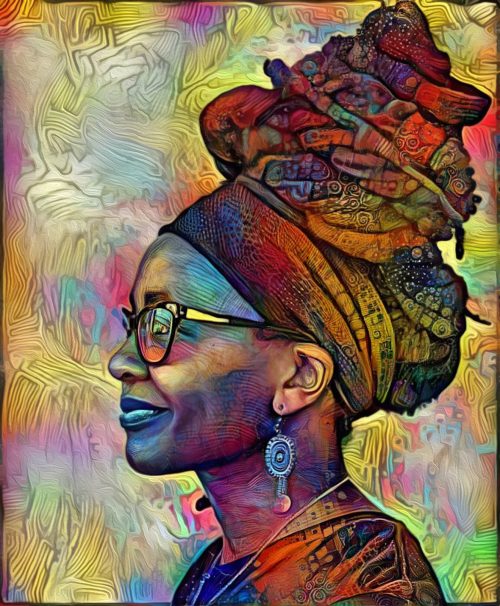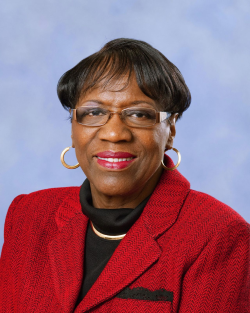Homepage
“When we think of the future of AI, many of us think of sentient robots or self-driving cars. These current visions, and subsequent actions to materialize them, are very much influenced by popular science fiction – say Blade Runner or Her. However, what if our innovations were inspired instead by feminist science fiction writers and theorists like Ursula K. Le Guin, Octavia Butler and Donna Haraway”
– Annie Brown, A Different Kind of Science Fiction: The Innovation Case For Centering Discussion Of Inclusion-Driven AI
Purpose

“Who Fears” Digital algorithm painting generated by Deep Dream AI, 2020 by Nettrice Gaskins, CC BY-SA 4.0
The Center of Artificial Intelligence & Cultural Computing grows awareness, literacy and proficiency in artificial intelligence and cultural computing across communities, economies and areas of study. We have been supported in the 2022/2023 academic year by a community funding grant through the federal Department of Education.
Artificial Intelligence (AI) has existed as a branch of study in the fields of mathematics, computer science, and philosophy for decades. Until fairly recently, AI has largely been constrained to these academic spheres. In the past few years, however, advances in software, tools and infrastructure have made AI increasingly accessible, leading to widespread adoption by businesses & individuals. These advances have largely been in the field of machine learning, a set of techniques for creating computer programs that identify patterns in large quantities of data and then use those patterns to make predictions, interact with the world, create art, and far more.
The rapid growth and adoption of machine learning creates a need for broader education, communication, and engagement around this emerging technology. Machine learning can find new patterns and help us make discoveries just as easily as it can reinforce and replicate existing patterns of harm and bias.
To this end, the Center also engages with the field of Cultural Computing, that turns a critical eye to the social and creative implications of computer technology.
By embedding this framework into our name and purpose statement, the Center of AI & Cultural Computing marks its commitment to PCC’s mission with the intent of expanding perspectives, applications and engagement in AI.
Faculty and Staff
The initial cohort of the AICC consisted of nine faculty and three supporting staff who have been leading the initial investigation, representing six different departments at both PCC and Clackamas Community College.
Activities
- Formed a reading group for faculty cohort to study basics of machine learning and cultural computing
- Held discussions on the role of generative AI in the classroom
- Spread training and information across the representative faculty departments
- Built out a computer lab in TEB225
- Planned a future AI literacy space at Willow Creek
- Gave talks and invited speakers for training broader faculty and staff
- Planned a capstone event for Fall 2023 on the intersection of AI and Art/Industry/Education
Talks and events of note
- 5/2/2023 chatGPT and Beyond: LLMs in the Classroom
- 5/18/2023 Understanding AI: Demystifying Artificial Intelligence for Educators and Professionals
- 5/19/2023 My Digital Self, Johannes Barfield
Symposium
The AICC is putting on an event in the Fall of 2023 from Wednesday Oct. 18th to Friday Oct. 20th, a symposium, for PCC employees and students. Over the course of this three days there will be speakers, panels, and discussions centering on three themes: AI in education, AI in industry, and AI in everyday life.
Newsletters
There have been occasional newsletters summarizing topics in AI and Cultural Computing that can be found on this page
Resources and further reading
Beyond the newsletters there have been a number of papers, articles, and books our faculty cohort has dabbled in to learn more about machine learning and cultural computing.
We have collected these resources and more in an informal bibliography
Locations

Senator Margaret Carter
Cascade Campus: the Center of AI & Cultural Computing is headquartered in the Margaret Carter Technical Education Building at PCC’s Cascade Campus. We have built out a computer lab in TEB225 to be used across multiple programs as an AI sandbox with computers capable of running image generation software such as stable-diffusion or even some large language models (LLMs) that are competitive with OpenAI’s chatGPT.
Willow Creek Opportunity Center: the Center of AI & Cultural Computing also coordinates the Artificial Intelligence Literacy Lab at PCC’s Willow Creek Opportunity Center in Washington County. This 1,900-square-foot space offers a flexible learning space to explore advanced technologies such as AI, AR/VR, projection mapping, spatial audio, and robotics.
